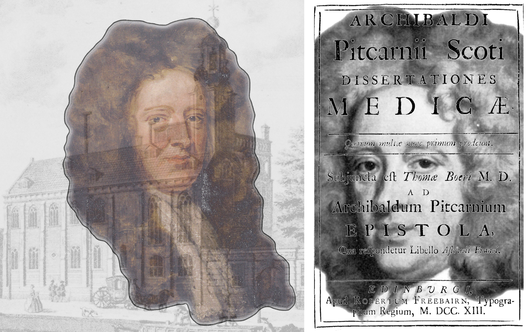Archibald Pitcairne1652–1713
Pitcairne was from an established family from Fife, Scotland. He was born in Edinburgh, received his education in Dalkeith and obtained an MA from Edinburgh University. During a visit to Paris his interests shifted to medicine and after studying mathematics at Edinburgh he received his medical degree from Rheims, in 1680. He set up a successful medical practice in Edinburgh which established his reputation and led to his invitation to the chair of medicine at Leyden in 1692. Boerhaave was one of his pupils. Pitcairne only stayed there for a year before returning to Edinburgh. He was a jovial man in the Johnsonian mould; he also wrote Latin verse, on which Johnson commented favourably. He was an avowed Jacobite and his political pamphlets often caused stirs. His humour is evident in the following “Appollagie for the author” that preceded his poem Babell; or the Assembly (1692):
Rhyme is a tyrant and a knave,
And ev’ry rhymer is a slave,
And consequentlie by meer force
Is driven like a very horse:
Therefor, the clergie should excuse him,
If they think he does not abuse them.
If this can not defend his verse,
He bids Mes John come kiss his –
He was an adherent of the iatro-mathematical or iatro-mechanical school, and this was the principal reason for his invitation to Leyden. His collected works commence with the statement that Pitcairne “was one of the First who leaving the Old conjectural Method of Physical Writers, struck into a New and more solid Way of Reasoning, grounded upon Observations and Mathematical Principles”. In his inaugural oration at Leyden “proving the Profession of Physic free from Tyranny of any Sect of Philosophers”. Pitcairne dwelled two visual phenomena: the first was an old one (floaters or muscae volitantes), and the second was relatively recent (the absence of vision when light falls on the optic disc). He is shown twice; on the left together with Leyden University at that time and on the right, in the title page of his Dissertation, which was published in 1713. After his death, this work was held in such high regard that one of his colleagues considered that “he has joined the Physician and the Mathematician so happily together, that he has given us in a manner, an œconomia animalis, at least he has explained and demonstrated the most difficult and most considerable things in œconomia animalis, that his dissertations are so far the only solid institutions of Medicine we now have”. The same writer also remarked that “He gote a vast income, but spent it upon drinking, and was twice drunk every day”! Nonetheless, his library was such as to be purchased by the Czar of Russia after his death. It has been said that the Edinburgh School of Medicine owed more to Pitcairne for its founding than to anyone else; he set in train the free treatment for the poor in exchange for permission to carry out dissections on unclaimed bodies. His own body was claimed.
